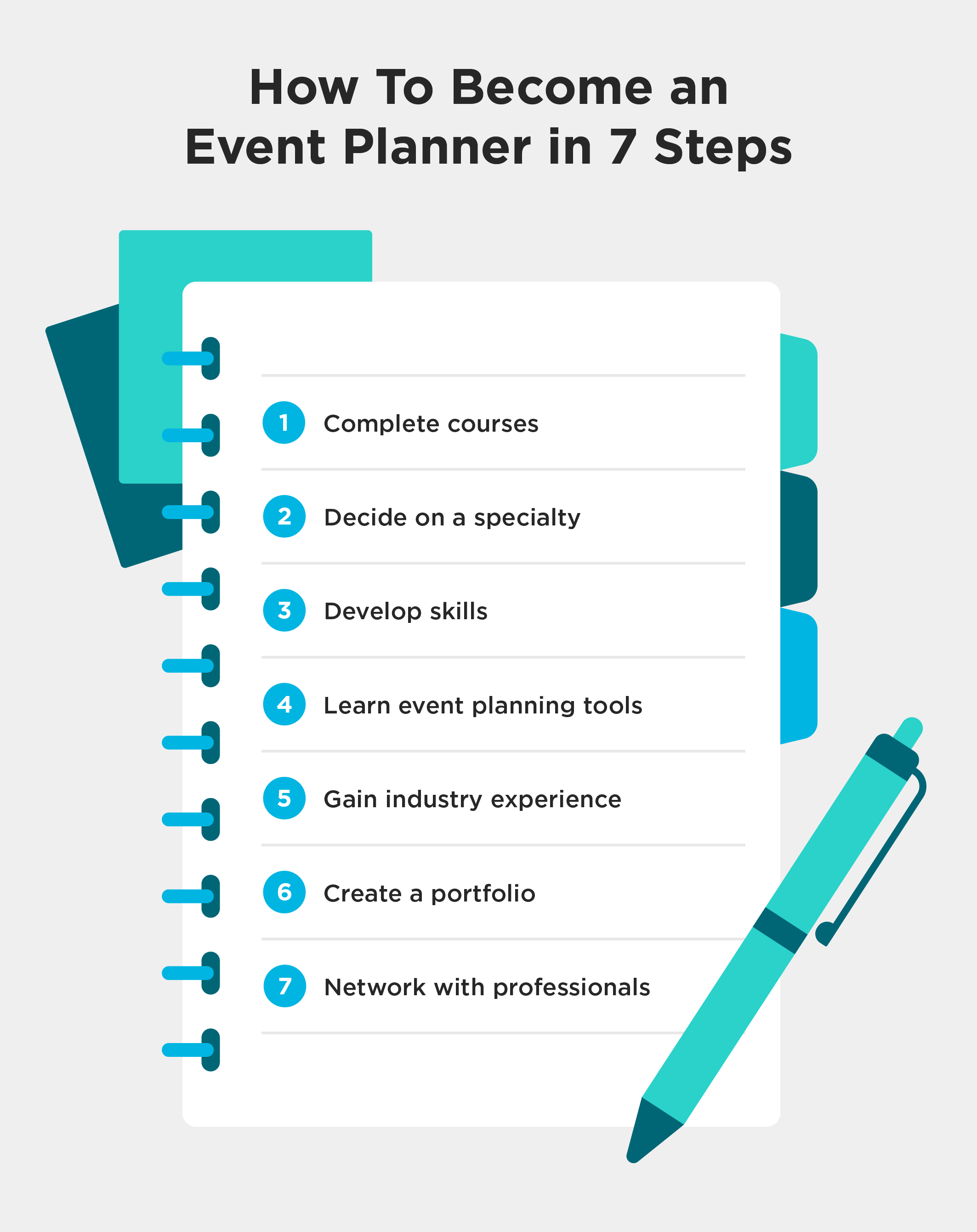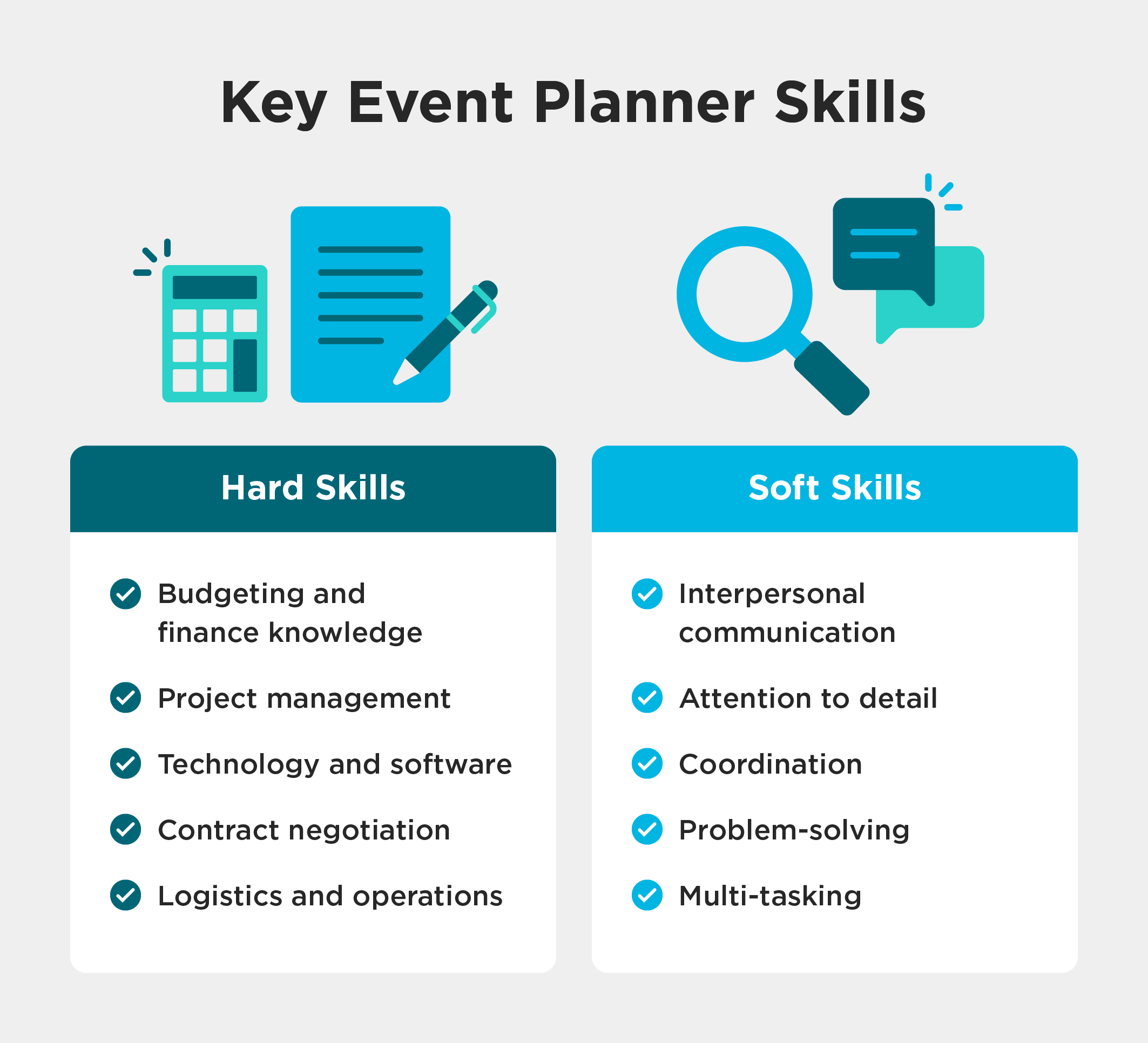How to Become An Event Planner in 6 Simple Steps (Skills + Salaries)

quick answer
To become an Event Planner, formal education in the form of a hospitality or business course or program is a good start. Hands-on experience is also key to building your portfolio and skills. Additional certifications can enhance your resume and help you land a job.
In This Article
Are you someone who loves bringing people together and event planning? If you always find yourself hosting gatherings at your house or organizing events just for fun, consider starting a career as an Event Planner.
The next three years present a great window to launch your event planning career in Canada, with job prospects ranging from moderate to good over the next three years in most Canadian provinces, according to the Government of Canada.
Becoming an Event Planner includes completing relevant courses or training, developing key skills, and building your portfolio.
Continue reading to discover event planning education requirements, key event planning skills you should have, what an Event Planner’s salary looks like, and more.
When it comes to becoming an Event Planner in Canada, qualifications and training can vary depending on the type of event planning you want to pursue.
While you may be able to begin your career as an Event Planner without any formal education or training, it may limit your chances at career growth in the future. Some sort of post-secondary education will be beneficial.
A few common options include:
Regardless of which Diploma program you choose, equip yourself with the resources and education you need to find a job after graduation. At Robertson, our Workforce Team supports students and graduates with resume and cover letter development, job search guidance, and interview preparation.
An Event Planner Certification can give you a competitive edge in the job market by demonstrating your expertise and commitment to the profession. It can also boost earning potential and open doors to new opportunities or industries.
Here are some relevant event planning certifications you may consider pursuing:

The options are endless regarding the types of events you can plan. Below, we’ve highlighted some great event planning career options.
Event Planners thrive on a blend of hard and soft skills. Honing your organizational skills, budgeting abilities, and technical knowledge (like mastering specific software) is crucial.
Additionally, soft skills like communication, creativity, and building rapport with clients and vendors are equally important.
To truly excel, many Event Planners rely on tools like:
Real-life experience, in addition to education, can also put you ahead. Consider the following opportunities:
Your event portfolio and professional resume are the cornerstones of landing your dream job as an Event Planner. They should work together to showcase your skills and experience in a captivating way. Here’s how to achieve that.
For your resume:
For your portfolio:
The great thing about a workplace experience program is that through a work practicum, you’ll get event planning training and will meet and network with industry professionals.
This is a great opportunity to meet people and figure out what type of events you want to work in after graduation and help answer questions like:
Some additional tips for networking with Event Planner professionals include:

Event Planners are responsible for coordinating details before, during, and after an event. They have an ever-growing to-do list and are continuously checking things off while more tasks are added to the list as they go.
Event Planners are the go-to person when it comes to every aspect of the event. They’re the ones who plan the event from the bottom up, coordinate all moving parts, and ensure that the event succeeds.
It’s their job to make sure that everything on the outside goes as smoothly as possible. This includes choosing great locations, hiring perfect vendors, and arranging any other details.
Many businesses and organizations often strongly rely on Event Planners to coordinate and plan conventions, meetings, trade shows, and parties. Event Planners negotiate vendor contracts, scout venues, meet with event stakeholders to understand the event’s purpose, and coordinate event logistics.
Some Event Planners specialize in specific kinds of events like concerts, festivals, meetings, conventions, trade shows, or weddings.
Event Planners wear many hats. They orchestrate the entire event experience, from conception to execution. Their duties encompass a wide range, including:
When considering a career in event planning, a mix of soft and hard skills is necessary. Some necessary hard skills include:
Soft skills of an Event Planner include:
To determine if your greatest strengths are a good fit for the soft skills required to be an Event Planner, ask yourself the following questions:

The average Event Planner salary is $26.44 per hour or $54,995 per year. While that’s the median salary, more experienced workers can earn $43.27 per hour or $85,502 per year. An Event Planner’s salary can vary depending on:
| Location | Low ($/hour) | Median ($/hour) | High ($/hour) |
|---|---|---|---|
| Yukon | $17.06 | $28.77 | $45/21 |
| British Columbia | $18 | $28.68 | $43.50 |
| Alberta | $19 | $27 | $49.45 |
| Manitoba | $15.50 | $23.56 | $34.62 |
| Ontario | $16.55 | $25.50 | $44.10 |
| Quebec | $20 | $27 | $38.46 |
| New Brunswick | $14.75 | $24.53 | $28.15 |
| Nova Scotia | $17.01 | $25 | $29.67 |
| Prince Edward Island | $16.61 | $23.57 | $37.99 |
| Newfoundland and Labrador | $15.08 | $24.29 | $33.17 |
| *No data available for Nunavut, Northwest Territories, or Saskatchewan Data from the Government of Canada |
|||
Charging an Hourly Rate
Charging a Flat Rate
To make sure you’re financially secure, ask for a 50% deposit immediately, and ask for the remaining 50% two weeks out.
Still not sure if event planning is the right career for you? Here are answers to the most common Event Planner questions.
To become an event planner without experience, start by building your knowledge with courses or certifications. Then, gain practical experience by volunteering at events or assisting established planners. Networking with industry professionals and showcasing your talents with a portfolio can also help launch your career.
How much an Event Planner earns per year depends on the type of event planning they do, location, and experience. On average, an Event Planner earns $54,995 per year, while more experienced workers make up to $85,502 per year. The amount an Event Planner makes for an event can vary every time.
Between 2022 and 2031, the event planning field is projected to see roughly 12,000 new job openings due to growth and replacement needs. However, an estimated 13,000 new job seekers will enter the market during this time.
Whether it’s a music festival or a wedding, Event Planners will always be an in-demand job to help people facilitate what they can’t for events. But, since there’s a job surplus, standing out from the competition by completing career-specific programs or certifications is crucial.
The best Degrees for event planning include hospitality, business administration, or public relations. These degrees provide valuable budgeting, communication, and organization skills, all essential for planner success.
Becoming an Event Planner in Canada is a great career choice for those who want to work in the hospitality industry in a fast-paced environment. If you’re interested in learning more, Robertson’s Event Planning and Hospitality Diploma Program is a great option for students who want to complete their education online or at one of Robertson’s Calgary or Edmonton campuses.
As a part of Robertson’s School of Business, the program equips students with the necessary tools, skills, and knowledge to successfully evaluate, organize, design, and execute different events to serve corporate and individual needs.
Connect with a Student’s Admissions Advisor for more information.
In This Article
Once you take the first step, one of our Student Admissions Advisors will get in touch to better understand your goals for the future.
Apply Now